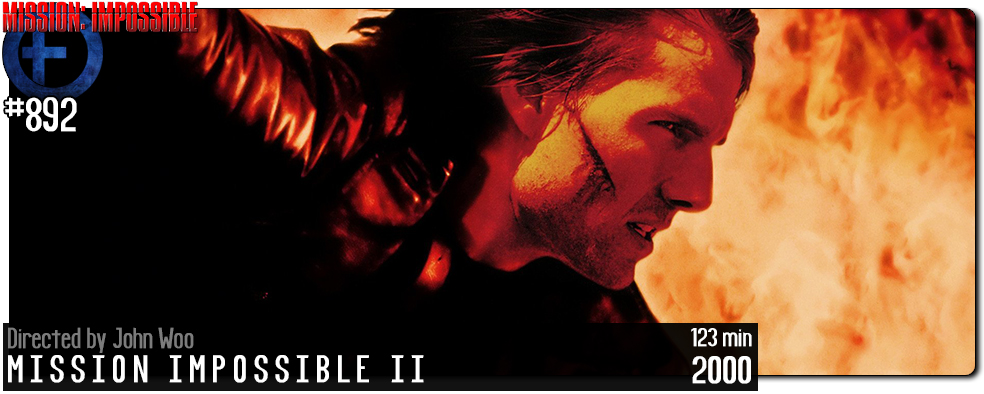Movie Review – Mission: Impossible II
Like being trapped in an elevator with somebody suffering from UBS, Mission: Impossible II rankles the nose and offends the spirit. Bereft of coherent logic, devoid of passion, and brimming with pompous, gargantuan action that means little, this sequel to DePalma’s sl0w-burn success is borderline unwatchable. If you removed the copious slow-motion in this thing, you’d have a 30 minute travelogue of Australia.
Principal Cast : Tom Cruise, Dougray Scott, Thandie Newton, Ving Rhames, Richard Roxburgh, John Polson, Brendan Gleeson, Anthony Hopkins, Rade Serbedzija, William Mapother, Dominic Purcell, Roland Kronmeyer.
Synopsis: IMF Agent Ethan Hunt returns to duty to track down a lethal poison gas threatening to kill millions around the world, unless a terrorist’s demands are met.
****
John Woozy
I want to take you on another journey. Back to the end of the 20th Century, in an era of explosive pop-culture expectation perpetuated by the massive phenomenon of Star Wars: The Phantom Menace. That film, the first Star Wars film in over a decade, was perhaps the most anticipated film of the 1990’s (hell, there’s even a film about the expectation for Phantom Menace!), until it actually came out and people realized they’d been duped into paying to see a film that was the creative equivalent of a person taking a dump on your chest. A year later, in 2000, John Woo’s Mission: Impossible II came out and, wouldn’t you know it, did almost exactly the same thing. John Woo is most assuredly a far better director than George Lucas, so expectation for MI2’s quality was undoubtedly founded on the history Woo had with a film camera – the man was fresh off Face/Off, the Travolta/Cage starrer that was an insane gangbusting joyride of a thing, and had a cult following from his Asian films like The Killer and Hard Boiled, among others. Here in Australia, Tom Cruise was enjoying a sort-of position as “adopted son” thanks to his marriage to “our” Nicole Kidman, and the fact that a large portion of the movie was filmed on our shores only added to the attention it received here. So you have Tom Cruise, John Woo, and an expectation that the franchise would deliver a superior film to the one DePalma delivered barely four years previous. Again, expectation; a film fans folly.
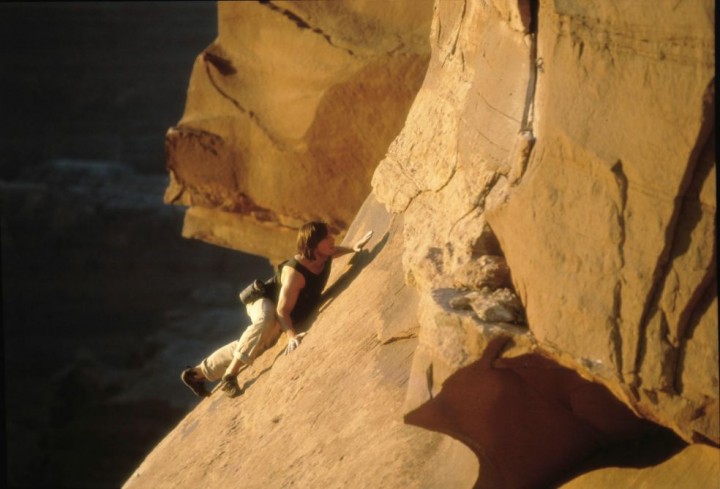
At the end of the first film, Ethan Hunt (Tom Cruise) had assumed his position as the point man for the IMF (Impossible Missions Force), and as this film opens, is on holiday engaging in some casual mountain climbing. He receives a mission from the IMF – somebody has stolen his identity and used it to assist bio-chemist Vladimir Nekhorvich (Rade Serbedzija) to enter the United States, carrying a highly dangerous toxin known as “Chimera”, which he developed. Hunt is tasked with getting close to rogue IMF agent Sean Ambrose (Dougray Scott), who is is believed has orchestrated the possible release of the chemical into the open, by getting just as close to his ex-girlfriend (and thief) Nyah Nordoff-Hall (Thandie Newton). Hunt and Nyah travel to Australia, where the chemical factories of Biocyte, the company developing Chimera, are located – there they meet up with Luther Stickell (Ving Rhames) and Billy Baird (John Polson), to infiltrate Biocyte and uncover the truth to Ambrose’s plans to wreak havoc on the world.
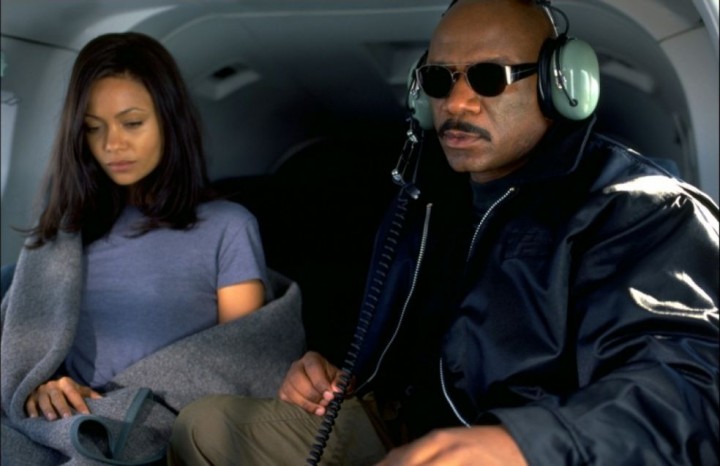
Months of blitzkrieg marketing and promotion, the tantalizing idea that Australia’s film production model would finally be shown to the world, action maestro John Woo at the helm, and a big-name star in Tom Cruise back headlining a major action film (between the original film and MI2, Cruise had appeared in three major cinematic releases – Jerry MacGuire, Magnolia, and Eyes Wide Shut, none of which were “blockbusters” in the true sense of the word); there was little for Paramount to do other than watch the cash roll in. In hindsight, there was probably no way any film, no mater how good, could accomplish all that was expected of such a dynamic collaboration of contributing cinematic powerhouses. Yet, even in saying that, there’s just no excuse for the inept, bloated, empty-headedness that thrust itself upon cinema screens back in May of 2000.
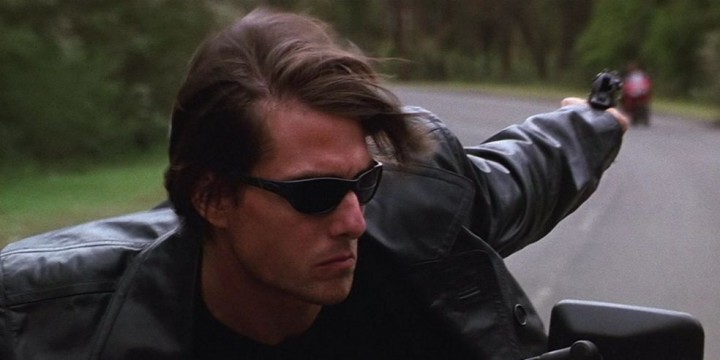
Mission: Impossible II is an abortion of a film. It’s the kind of action film that makes actual action films look good. From it’s incredibly beautiful opening sequence involving Tom Cruise dangling from the sheer rock cliffs of some far-flung mountain range, to it’s insipidly stupid beach-set finale, this film is a train wreck of sullied intentions from the word go. It’s a film so obviously catering to the ego of either its star or director (or both), and a film so obviously over-budgeted by Paramount, who only say dollar-signs when Woo came aboard, there’s little wonder its own gravitational field didn’t develop into a black hole and suck all matter inside itself. The story had potential to be terrific, with biological weapons being a particularly popular MacGuffin at the time (a similar idea was used in Michael Bay’s The Rock, only a few years earlier), yet the appalling screenplay by Robert Towne, who pulled the fat out of the fire for DePalma in the first film, is as ill-conceived and middle-ground as Woo’s direction of it.
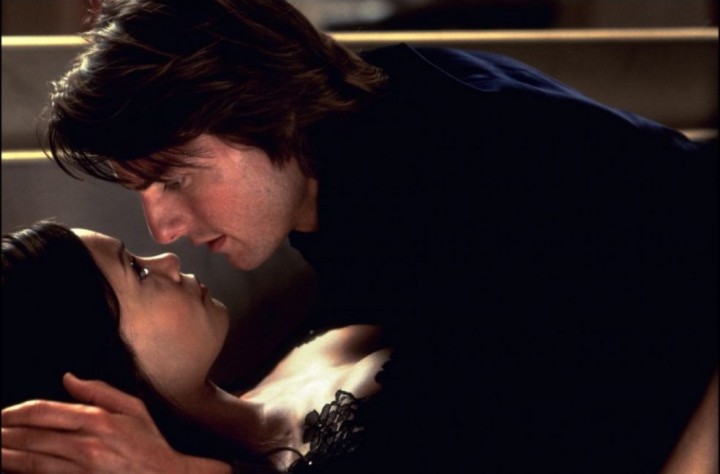
Fatuously written, devoid of a moral center or even characters we care about (Hunt included), this film is a passionless, painfully narcissistic affair that warrants avoiding. It’s that bad. John Woo, who helms this thing with all his style in full bloom, cannot build any kind of suspense or momentum, as he hurtles Cruise from one overblown slo-motion sequence to the next. Now, I’m as big a fan of Woo’s career as anyone, with The Killer being one of my “all time” favorite Asian films ever. But here – well, the man prostitutes his talent in the name of cheap, never-ending style over any kind of substance. Cruise becomes more a super-hero than a super-spy, his wildly long hair (a byproduct of the time, no doubt) flying everywhere each time he leaps, jumps, rolls or flies through the air, using Woo’s patented “defying gravity” style to get the job done. The reduction of tension in the film by having it appear that Hunt is practically bulletproof, immune to the laws of physics, nature and science, is considerable. It’s not entirely Cruise’s fault (although perhaps it is, since he’s a producer on this movie!) but more in Woo’s overt sense of visual pleasure at the expense of realism.
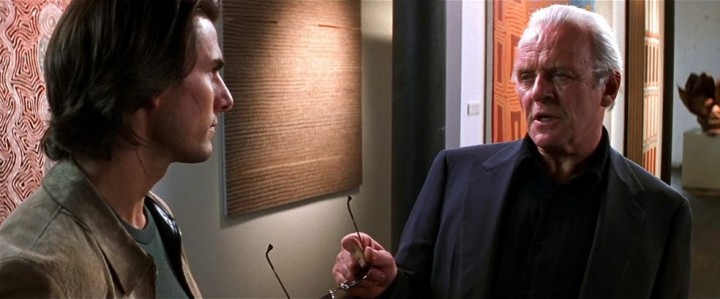
Nope, nobody could ever consider this film realistic. If the first film’s borderline-psychotic mantra of subterfuge was enthralling, here any attempt at subtlety or, you know, spying, is bombarded by impracticality and superficiality. The franchise’s patented “mask disguise” conceit is overused here, as it would be in the second sequel, and as such reduces its impact for the audience. That’s if the audience isn’t already bleeding from the ears thanks to a bombastic, incoherent soundtrack filled with musical cues designed to break the sound barrier, and an effects track that runs the gamut of generic and comes out somewhere in the vicinity of overblown. The entire cast are swamped under the cataclysmically awful idea that Tom Cruise’s enormous head should be front and center nearly all the time – Thandie Newton, who I crushed on majorly when I saw this film, is elegantly beautiful, and vastly more refined than this film ever is, while Ving Rhames is reduced to comedy relief, and poor John Polson, the man who gave the world Tropfest, the best short film festival in the world, might as well be the poster boy for Generic Australian.
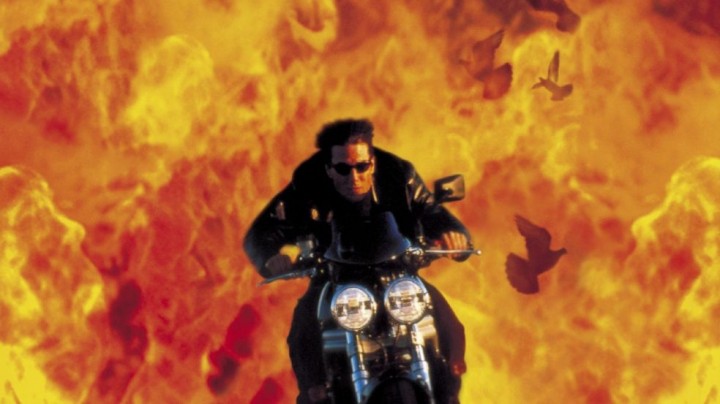
But it’s the film’s villains, Dougray Scott and Richard Roxburgh (the latter who appeared as the arch-melodramatic Count in Moulin Rouge), that are the most egregiously done by here. A villain needs to have a point, needs to have a purpose, or at least an agenda, and Scott’s renegade agent lacks even the simplest of them. He’s all snarling and bombast – interestingly, Scott was tapped to play Wolverine in Bryan Singer’s X-Men film, before production on MI2 ran over meaning Hugh Jackman had to take the role…. a fact I bet Scott is still kicking himself over – but completely lacking in purpose. Roxburgh fares little better, as insidiously slimy a henchman as there ever has been. Neither are really a competent nemesis for Cruise’s Hunt, who looks for all the world like he could stop them with a hand tied behind his back…. which he almost does, at one point.
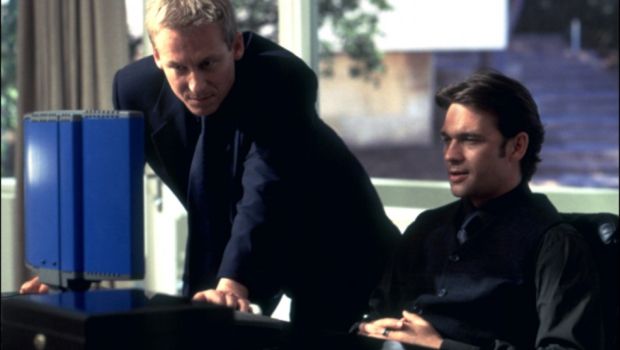
Mission: Impossible II proved to be the franchise’s dark sheep, a fatuously insipid affair that offers little respite from its discombobulating story and action sequences, all of which are designed purely to serve as a launch pad for Cruise’s resurgent action career. Thankfully, Cruise learned from this and the sequels that followed improved considerably, but if you’re wanting to see an utter train-wreck of one man’s directorial career, this is as good a place to start as any. It’s telling that Woo followed this up with the middling Windtalkers, and the even worse Paycheck, both of which ended up his Hollywood stint and saw him return to China. Mission: Impossible II is a disaster by any standard, a hodge-podge of inanity and breathtaking overproduction, resulting in a film that’s all style, zero substance.


